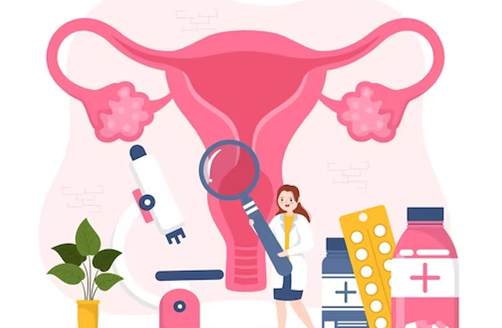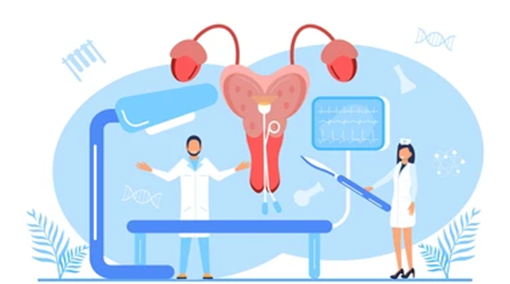A miscarriage is devastating and emotionally challenging for anyone. Following a miscarriage many women undergo medical examinations to understand the root cause. Thick endometrium after miscarriage is a common finding after medical tests.
In this blog, we will explore what a thick endometrium after miscarriage can indicate.
Dr. Hrishikesh Pai throws light on the possible causes and ways to manage it. He is often regarded as the best IVF doctor in mumbai, India. You can meet him in his Clinic Bloom Ivf in locations such as Navi Mumbai, Nagpur, Kolkata, and Lucknow.
Ready to find the right care after a miscarriage? Visit Dr. Hrishikesh Pai for expert treatment and start your journey to recovery and well-being.
Before moving ahead, you must know what endometrium is and its role in pregnancy!! Let us understand why it is so important!
What is endometrium and its role in pregnancy?

The endometrium is the innermost lining of the uterus. It goes through changes during your menstrual cycle. Hence, playing an important role in pregnancy.
The endometrium thickens to prepare the uterus for pregnancy. If fertilization occurs, the embryo gets implanted into the endometrium. The endometrium thickens further after implantation to form the placenta. This endometrium lining sheds if you do not get pregnant.
Sometimes even after miscarriage, the endometrium lining does not go back to its normal thickness.
In such cases, you must consult a healthcare provider. You can also explore IUI or IVF treatment in India for the same.
Bloom IVF clinic, led by DR. Hrishikesh Pai has all the modern amenities that can help you become parents!! Visit us today for a seamless journey to parenthood!
But, before any treatment, you should know what can cause it. Right? Let’s explore the possible causes of thick endometrium!!
Causes of thick endometrium after miscarriage
The causes of the thick uterine lining after miscarriage can be:
- The incomplete expulsion of fetal placenta or tissues after miscarriage can cause thick endometrium. These retained products of conception cause thick endometrium lining after miscarriage.
- Infection of endometrium or endometritis can occur. This infection leads to thick endometrium after miscarriage.
- Sometimes fibroids can grow in the uterine cavity. They are known as submucus fibroids. They can make the uterine lining thick. These fibroids are common after a miscarriage.
- Adenomyosis, or the presence of endometrial tissue in the muscular walls of the uterus. This causes enlargement of the uterus and thickening of the endometrium.
- Imbalances in estrogen and progesterone levels can lead to thick endometrium after miscarriage.
- Gestational trophoblastic disease or Intrauterine adhesions are a few other factors responsible.
To ensure your optimal reproductive health, book your consultationtoday with Dr. Hrishikesh Pai, an IVF doctor in Delhi. You can also visit his clinic, Bloom IVF, which is frequently considered as the best IVF center in Mumbai.
Struggling to find the right treatment for your thick endometrium? Let’s navigate through the various management options available.
The next steps: Management and treatment options

There are various management and treatment options for thick endometrium after miscarriage. The management and treatment options may include:
- Expectant management: This involves the monitoring of endometrial lining thickness after miscarriage. This is appropriate if there is normal endometrial thickness after miscarriage. If other concerning symptoms are present, then this method is not appropriate.
- Medical treatment:
- Progestin therapy can help if hormonal imbalances have caused endometrial thickening. Progestin is a synthetic form of progesterone. It can make the endometrium lining thing and regulate its growth.
- The doctor may prescribe antibiotics to treat thick endometrium if it is caused by an infection or inflammation.
- Surgical Intervention:
- Dilation and curettage (D&C): The uterine lining is scraped to remove any remaining products of conception or thick tissues. This is recommended if the thick endometrium is causing significant symptoms.
- Hysteroscopy: A thin tube with a camera is inserted through the cervix. This helps the doctors to visualize the inside of the uterus. They can then remove any abnormal tissue or growth like submucosal fibroids or intrauterine adhesions.
- Treatment of gestational trophoblastic disease. This is necessary if GTD is suspected to be causing the thickening of endometrium.
- Regular follow-up with your doctor is important. This helps in monitoring the thickness of the endometrium and addresses issues if any.
The choice of management strategy depends on the underlying cause of endometrial thickening. Other factors that can impact the decision are the severity of symptoms and individual health.
It is very important to discuss these with an experienced and qualified doctor to address them effectively.
You can visit Dr. Hrishikesh Pai, to address these issues. He is also regarded as the best IVF doctor in India due to his vast experience. Get all your gynecology and infertility needs sorted.
Your search for a good IVF center in India ends here. Contact Bloom IVF Center today!
Wondering how to keep track of your endometrial health post-miscarriage? Let’s discuss the importance of follow-up and monitoring now!
Follow-up and monitoring

Follow-up and monitoring for thick endometrium after miscarriage is very crucial. This can ensure optimal recovery and future reproductive health.
After a miscarriage, doctors recommend tests and evaluations to identify the cause.
The doctor asks for regular follow-ups depending on the severity and underlying cause of the endometrial lining thickness after miscarriage.
The evaluation of your hormone levels is also necessary. After this, your doctor can suggest medication, if necessary to regular hormonal levels.
If you are planning to conceive again after miscarriage, then regular monitoring becomes crucial. Your doctor will assess if you have normal endometrial thickness after miscarriage. It is important for a healthy pregnancy afterward.
In some cases where the cause of thick endometrium is complex or difficult to manage, you may need to visit a specialist.
Consult your condition with Dr. Hrishikesh Pai, a renowned IVF doctor in Mumbai.
Ready to take charge of your reproductive health after a miscarriage? Let’s wrap up our journey with some key takeaways.
Conclusion
Thick endometrium after miscarriage is common. There are various underlying causes to it, but the key is proper management and treatment. It ensures optimal reproductive health for conceiving later.
Consulting with an experienced and qualified IVF doctor, like Dr. Pai can provide personalized care. You can get effective solutions for all fertility problems in Bloom IVF, often considered the best IVF center in Mumbai. It has state-of-the-art facilities for gynecological and infertility treatments.
Don’t hesitate to seek help and book your consultation for a brighter reproductive future.
FAQs
Q1. What happens if the endometrium is thick?
Ans. Thick endometrium can cause various complications. These include hormonal imbalances, infections, fibroids, or other issues. Thick endometrium can affect pregnancy and fertility. It is characterized by heavy bleeding, bleeding after menopause, or anemia.
Q2. Can I get pregnant with 6mm endometrial thickness?
Ans. Several studies have shown that a thin endometrium lowers the chance of embryo implantation. However, there isn’t a specific thickness that guarantees success. Some women have become pregnant with an endometrium less than 6 mm thick, and there’s even a reported case of successful pregnancy with an endometrium only 4 mm thick.

